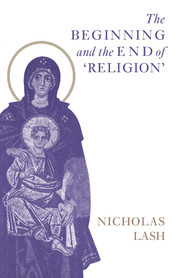Book contents
- Frontmatter
- Contents
- Preface
- PART ONE A MEETING-PLACE FOR TRUTH
- PART TWO EMERGING FROM MODERNITY
- 4 Observation, revelation and the posterity of Noah
- 5 On what kinds of things there are
- 6 Contemplation, metaphor and real knowledge
- 7 When did the theologians lose interest in theology?
- 8 Anselm seeking
- 9 Creation, courtesy and contemplation
- 10 Hollow centres and holy places
- 11 Hoping against hope, or Abraham's dilemma
- 12 Eagles and sheep: Christianity and the public order beyond modernity
- 13 Incarnation and determinate freedom
- 14 Beyond the end of history?
- List of works cited
- Index
12 - Eagles and sheep: Christianity and the public order beyond modernity
Published online by Cambridge University Press: 05 March 2012
- Frontmatter
- Contents
- Preface
- PART ONE A MEETING-PLACE FOR TRUTH
- PART TWO EMERGING FROM MODERNITY
- 4 Observation, revelation and the posterity of Noah
- 5 On what kinds of things there are
- 6 Contemplation, metaphor and real knowledge
- 7 When did the theologians lose interest in theology?
- 8 Anselm seeking
- 9 Creation, courtesy and contemplation
- 10 Hollow centres and holy places
- 11 Hoping against hope, or Abraham's dilemma
- 12 Eagles and sheep: Christianity and the public order beyond modernity
- 13 Incarnation and determinate freedom
- 14 Beyond the end of history?
- List of works cited
- Index
Summary
The world we had got used to is crumbling before our very eyes. Because this world was, to a significant extent, construct in terror, the disappearance of familiar, threatening landmarks has, understandably and quite properly, given rise to rejoicing. There are, I think, no precedents for such swift collapse, almost without bloodshed, of vast sprawling networks of oppression. And there could hardly be deeper cause for gratitude than the fading of the fear of nuclear war.
Nevertheless, celebration would be premature. We do not yet know what new world will now be made, nor what confused mixtures of dark and light, of friendship and inhumanity, it will contain. The world now ending is the ‘modern’ world: a world which came to birth with Locke and Newton, Jefferson and Descartes; a world of which (at its contemporary edge) communism and capitalism were variant expressions.
If ever there were a kairos, a moment of opportunity, an occasion for coming to our senses, for understanding something, a unique and unrepeatable occasion for that repentance which Jews call teshuvah and Christians ‘conversion’, it is surely now. Our first response to what is happening, I acknowledged, should be of gratitude and rejoicing. But our second should be to call into question, to subject to relentless critical examination, the narratives and thought-forms which made the modern world, which made (that is to say) ourselves.
- Type
- Chapter
- Information
- The Beginning and the End of 'Religion' , pp. 219 - 236Publisher: Cambridge University PressPrint publication year: 1996



